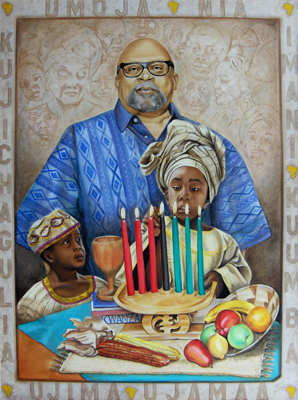Spirit Of Kwanzaa
Spirit Of Kwanzaa
Safeguarding the beauty of your original fine art is our top priority. CLICK HERE for instructions on purchasing this masterpiece.
Share
Original - Oil on canvas
30" x 40"
The spirits of African American ancestors surround Dr.Maulana Karenga who started more than 30 years ago the Kwanzaa celebration that is practiced by people around the world. Kwanzaa is an African American and Pan-African holiday which celebrates family, community and culture. Kwanzaa is a CULTURAL holiday, not a religious one.
Kwanzaa was created in 1996 by Dr. Maulana Karenga, professor and chair of the Department of Black Studies at California State University, Long Beach. It is celebrated from December 26 through January 1.
He wanted to speak our own cultural truth to the world. Culture is a fundamental way of being human in the world. So, he came up with the concept of Kwanzaa, a Swahili word that means first fruit. Mr. Karenga saw the celebration as a means of introducing Black Americans to the values, customs and traditions of Africa. "It reaffirms our rootedness in Africa," he says. "It's stepping back to Black!"
In the foreground of this painting with Mr. Karenga and the children, is the traditional setting for a Kwanzaa celebration showing the seven symbols of Kwanzaa. The crops (Mazao): These are symbolic of African harvest celebrations and the rewards of productive and collective labor. The Mat (Mkeka) This is symbolic of our tradition and history and therefore, the foundation on which we build. The Candle Holder (Kinara) This is symbolic of our roots, our parents, our people and continental Africa. The Corn (Muhindi): This is symbolic of our children and our future which they embody. The Seven Candles (Mishumaa Saba): These are symbolic of the Nguzo Saba, the seven principals, the matrix and minimum set of values which African people are urged to live by in order to rescue and reconstruct their lives in their own image and according to their own needs. The Unity Cup (Kikombe cha Umoja): This is symbolic of the foundational principle and practice of unity which makes all else possible. The Gifts (Zawadi): These are symbolic of the labor and love of parents and the commitments made and kept by the children.
The colors of Kwanzaa are black, red and green: Black for the people, red for their struggle, and green for the future and hope that comes from their struggle. Gifts are given mainly to children, but must always include a book and a heritage symbol. The book is to emphasize the African value of tradition and learning stressed since ancient Egypt, and the heritage symbol to reaffirm and reinforce the African commitment to tradition and history. Hand made gifts are emphasized.
Framing the setting are the seven principals of Kwanzaa (the primary values): 1. Umoja (unity) To strive for and maintain unity in the family, community, nation and race; 2. Kujichagulia (self determination) To define ourselves, name ourselves, create for ourselves and speak for ourselves; 3. Ujima (collective work and responsibility) To build and maintain our community together and make our brothers and sisters problems our own and solve them together; 4. Ujamaa (cooperative economics) To build and maintain our own stores, shops and other businesses and to profit from them together. 5. Nia (purpose) To make our collective vocation the building and developing of our community in order to restore our people to their traditional greatness; 6. Kuumba (creativity) To do always as much as we can, in order to leave our community more beautiful and beneficial than we inherited it; 7. Imani (faith) To believe with all our heart in our people, our parents, our teachers, our leaders and the righteousness and victory of our struggle.

